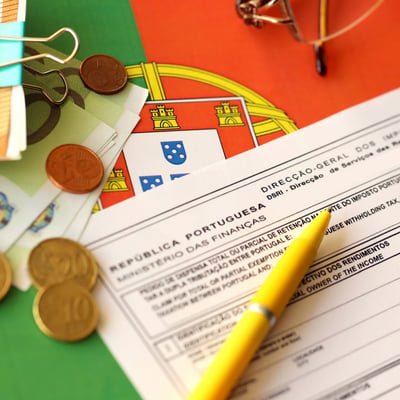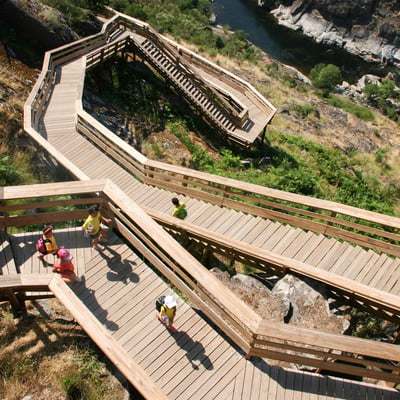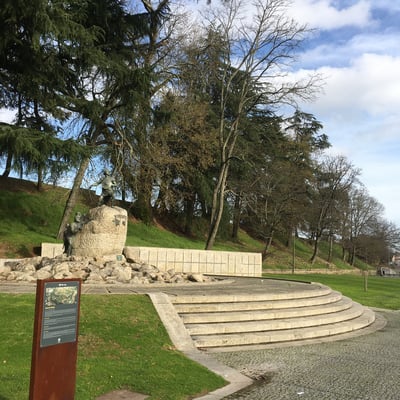1
00:00:03,256 –> 00:00:06,356
Alfredo: Boas, Sílvia. Onde é que anda o resto da malta?
{{Alfredo: Hi, Sílvia. Where are the rest of the guys?}}
2
00:00:07,136 –> 00:00:11,752
O casamento do Samuel e da Liliana é já daqui a uma hora, e ainda não chegou ninguém!
{{Samuel and Liliana’s wedding is in an hour and no one has arrived yet!}}
3
00:00:12,146 –> 00:00:19,385
Sílvia: Pá, o Rui e a Sara já estão a caminho. O João apanhou alta piela ontem e ainda deve estar de ressaca.
{{Sílvia: Man, Rui and Sara are already on their way. João got wasted yesterday and must still be hungover.}}
4
00:00:19,826 –> 00:00:22,226
Alfredo: Esse gajo é sempre a mesma cena.
{{Alfredo: That guy is always the same.}}
5
00:00:22,616 –> 00:00:24,696
Sílvia: Ele é bacano, quando não está bêbedo.
{{Sílvia: He’s cool, when he’s not drunk.}}
6
00:00:25,166 –> 00:00:27,546
Alfredo: Que é tipo 70% do tempo.
{{Alfredo: Which is like 70% of the time.}}
7
00:00:28,126 –> 00:00:30,097
Sílvia: Vá, não exageremos…
{{Sílvia: Come on, let’s not exaggerate…}}
8
00:00:30,716 –> 00:00:35,145
Alfredo: Se vamos esperar por eles, mais vale esperar sentados. Queres ir tomar café?
{{Alfredo: If we are going to wait for them, it is better to wait seated. Do you want to go for a coffee?}}
9
00:00:35,756 –> 00:00:39,046
Sílvia: Boa ideia. Está um briol cá fora… Bora lá.
{{Sílvia: Good idea. It’s freezing outside… Let’s go.}}
10
00:00:39,696 –> 00:00:42,991
Alfredo: Acho que vou comer uma bifana. Queres alguma coisa, tu?
{{Alfredo: I think I’m going to have a ‘bifana’ (marinated pork cutlet sandwich). Do you want something?}}
11
00:00:43,516 –> 00:00:47,786
Sílvia: Ui, não. Comi bué ao almoço. Pede-me aí um fino, só.
{{Sílvia: Ooff, no. I had too much to eat at lunch. Just ask for a ‘fino’ (small draft beer) for me.}}
12
00:00:48,266 –> 00:00:53,326
Alfredo: É para já… Desculpe, senhor empregado, era uma bifana e dois finos.
{{Alfredo: Right away… Excuse me, sir, it’ll be a ‘bifana’ and two ‘finos’.}}
13
00:00:53,866 –> 00:00:56,226
Sílvia: Daqui a um bocado devíamos ir andando, também.
{{Sílvia: We should get going too, soon.}}
14
00:00:56,776 –> 00:01:00,906
Alfredo: Esperamos mais uma beca. Olha, chegaste a ir ver o novo Star Wars?
{{Alfredo: We’ll wait a bit longer. Anyway, did you ever go to see the new Star Wars?}}
15
00:01:01,456 –> 00:01:03,621
Sílvia: Ya. Quem me dera não ter visto.
{{Sílvia: Yeah. I wish I hadn’t seen it.}}
16
00:01:04,216 –> 00:01:04,957
Alfredo: Não gostaste?
{{Alfredo: Didn’t you like it?}}
17
00:01:05,476 –> 00:01:10,716
Sílvia: ‘Tás a gozar? Claro que não. Ganda bosta. Nunca vi um filme tão rasca.
{{Sílvia: Are you kidding? Of course not. What a load of crap. I’ve never seen a movie so bad.}}
18
00:01:11,116 –> 00:01:14,916
Alfredo: A sério? Eu achei altamente! Brutal, mesmo.
{{Alfredo: Really? I thought it was cool! Amazing, really.}}
19
00:01:15,436 –> 00:01:20,565
Sílvia: Eu achei um bocado podre. Estou arrependida de ter gastado guito no bilhete.
{{Sílvia: I thought it sucked a bit. I’m sorry I spent money on the ticket.}}
20
00:01:20,966 –> 00:01:23,100
Alfredo: Tu também és cá uma esquisita…
{{Alfredo: You’re such a weirdo…}}
21
00:01:23,486 –> 00:01:25,786
Sílvia: Cala-te, pá. Tenho é bom gosto.
{{Sílvia: Shut up, man. I have good taste.}}
22
00:01:26,306 –> 00:01:29,036
Alfredo: E o último Piratas das Caraíbas, curtiste?
{{Alfredo: And the last Pirates of the Caribbean, did you enjoy it?}}
23
00:01:29,446 –> 00:01:33,596
Sílvia: É melhor não entrarmos por aí… Espera aí, ‘tão-me a ligar.
{{Sílvia: We better not go there… Wait a minute, someone is calling me.}}
24
00:01:34,296 –> 00:01:34,666
Alfredo: Força.
{{Alfredo: Go ahead.}}
25
00:01:35,226 –> 00:01:37,244
Sílvia: É o João. Perdeu o autocarro.
{{Sílvia: It’s João. He missed the bus.}}
26
00:01:37,666 –> 00:01:40,055
Alfredo: Claro. É preciso ir buscá-lo?
{{Alfredo: Of course. Do we have to go pick him up?}}
27
00:01:40,466 –> 00:01:43,021
Sílvia: Népia. Ele diz que apanhou boleia de um hippie,
{{Sílvia: Nope. He says he got a ride from a hippie,}}
28
00:01:43,236 –> 00:01:45,520
e para nós irmos andando que ele já vai lá ter.
{{and for us to get going and he’ll meet us there.}}
29
00:01:45,886 –> 00:01:48,332
Alfredo: Fixe. Vou só pagar e já bazamos.
{{Alfredo: Cool. I’ll just pay and we’ll get going.}}

 Natacha
Natacha Pedro
Pedro











That was a hard one! But it is good to start to learn a little slang.
Eu não gostei isto. Muito difícil ! Eu tive ver o translation!
Yes, give me slang 👍👍👍
Hello, for me, this was too fast to follow, if you could have option to slow it dow, it would be a big help and for many many non native speakers.
Also if you could have the written Portuguese with the exact way for us in English to pronounce correctly.
Muito obrgado
Thanks for your feedback! If you keep clicking on the 1x button in the top right of the player controls, you can change the speed. I would recommend 0.8x because if you go much lower it starts to sound a bit distorted.
Goodness me. That seemed a bit tougher than B1!
You’re right, I bumped it up to B2! These levels are just estimates, so sometimes the actual perceived difficulty ends up being higher than what the individual words seem to indicate. In this case, with so much slang, it should definitely be higher. 🙂
Vocês usam “já” em tantos contextos!
Para mim, aprender o calão e a gíria é a cois mais difícil quando estás a estudar um lingua. Também o uso correto das preposições…
Muito obrigado pelo este “shortie.” Foi excelente para este objetivo.
I keep coming back to this one. I was totally lost at first, but the vocabulary is so great! I ran it by my Portuguese boyfriend who praised PP for making this dialogue sound so authentic.
Happy to finally reach the end of the units after three months… Now, some thousands of words and sentences to review. Anyway, after I make a dent in the review, what is best to study next?
Wow, 3 months?? You’re fast! Parabéns! Keep on eye out for more new units coming soon. After going through all that, we’d love to hear your feedback. Email us at [email protected] if you have any suggestions for units or topics you’d like to see more of, or anything else you’d like to share about your experience with the units so far.
I would recommend staying consistent with Smart Review, as you have been. If there are any topics that you notice you struggle with more than others, you could even go back to those Units to read over the Learning Notes again, since there are so many details to process in a few months! And check out the Verbs section (under Learn) if there are any tenses you want more practice with.
Spend a lot of time in the Practice section now to start generalizing your knowledge to something more realistic. The episodes can be filtered by level and topic, and there are hundreds to explore. Challenge yourself to understand the audios with and without the translation toggled on and practice repeating what you hear. I hope that helps a bit with taking the next steps!
That was challenging but I really enjoyed it, thank you!
Thanks Molly! I speak other Romance languages, which is a great help. I will continue with the Smart Review and look more at the Practice section. I do have one suggestion at this point, which is to use some kind of AI so users need to review sufficiently before proceeding to the next step, but I have no idea how challenging that is to do technically. I liked the path through the units. I hope I will also find a path through the practices. 🙂
Funny you mention that because we were just discussing some options for Smart Review recently and considering whether we should stop users from proceeding if they haven’t reviewed enough. I worry some users wouldn’t like to be blocked entirely, but I think there’s definitely a lot more we can do to encourage and work in more frequent reviewing to the current path. Lots to think about!
The Practice section is definitely more self-guided — there’s not really a path like there is with the Units. Some people like to create their own “paths” by choosing a topic or level (A1, A2, B1, etc.) and trying to work through all the episodes in that category.
Then perhaps offering it as an option would be good. As to the Practice section, having optional paths would be nice too.
Ufa! Finally reached the end, but there is still a lot of reviewing left to do, both grammar and phrases. This is my fourth foreign language I have the pleasure to learn, but I’ve never had so much fun doing it before. My compliments, guys. Your course rocks. You gave me a solid base to build upon. If I could make a suggestion, as far as topics go, to dedicate one unit to sports, with the emphasis on soccer, I mean football since it’s always a popular conversation topic. And one more question: you stated that you use American English in this course, but I’ve noticed that you used the British spelling for “color”, “neighbor”, etc. You also used “roundabout” for “traffic circle”. Are those Canadian variants of the American English? Thanks again for this great course.
Congrats on reaching the end!! Keep an eye out for new units, too. We recently added units about the verb ficar and air travel, and another on diminutives and augmentatives is coming soon (plus plenty more in the works!). The unit on Sports is a great idea. It’s been on our list for a while, but we haven’t started it, so I’ll make a note to bump that up in priority.
As for the English, you’re exactly right — those spellings are used in Canadian English, where Joel is from. I guess you could say we lean toward ‘North American English’ generally (a combination of American and Canadian). I’m from the U.S. so Joel is always calling me out when I forget the u’s. 😛
Eu adoro esse episodio!! Précisa ter amigos portugueses para aprender facilmente o calao
Curti bué esse episodio mas tenho que escuta-lo muitas vezes.
This lesson is the last lesson of the last B2 unit. It’s taken me 7+ months to cover all the units from A1 through B2. I have to admit it’s been an intimidating experience; Portuguese is a very tough language. I’m definitely a bit apprehensive about my upcoming trip to Portugal. I know I’m going to fall flat on my face the first time someone tries to talk to me in Portuguese! 🙂
My plan now is to go back to the start and do it all again, as well as go through all the shorties and practice modules. I hope when I get back to this slang unit a year from now I’ll have a better grasp of the language. The hardest part is that so much of the process involves pure memorization and my aging brain isn’t what it used to be. 🙂
Thanks to all the PP team for the great work that has been put into this site. It’s clearly the premiere learning tool for European Portuguese.
Peter
Congrats Peter! And thank you for the kind words. 😁 One tip for your next round: Spend a lot of time with the Smart Review flash cards and use them as speaking practice! It’s a good exercise to practice formulating/producing the language without any help. 😊
That’s exactly my plan. I hadn’t realized it would take seven months to get through the Units the first time through, and that was doing some lessons pretty much every day. I suspect my second run through will take even longer, especially now that I’m no longer waiting out the pandemic and life is starting to return to normal.
I loved this but it was like they were speaking a different language. Haha.
GOSTEI MUITO DESTA UNIDADE, E TAMBEM DO DIALOGO. PARESSIA QUE A MULHER ESTAVA A RIR UM POUCO, ACHO QUE ELA GOSTAVA TAMBEM DE FAZER UM DIALOGO DE PURAS GIRIAS…
Hi! Thanks for a great episode for learning slang in context!
I am confused about the expression « Ele já vai lá ter ». Is this just one of those things I need to take on faith 😀 cause I don’t see why the verb ter (to have) is being used in this sentence to mean lI’ll meet you there » I can understand the different word order than in English, bit would have expected the verb to be ser or encontrar – « Ele já vai lá ser » or « Ele já vai lá encontrar ». Could you explain this please? Thanks!
This is a very tricky one! “Ir ter com” (as well as “Ir ter a” / “Vir ter com” / “Vir ter a” / “Ir lá ter”) it’s an idiom, which means that it can only be understood as a whole and not by each word it contains. Its origin may be way back in the medieval times and it should be assumed that it means “ir/vir ter encontro com “going/coming to HAVE (a meeting/an encounter) with/at”.
So, “Ele já vai lá ter” means that “He’s about to go there TO HAVE an encounter/a meeting (at that place/with those people)”!
Another simple example:
“Já vou ter contigo” = I’ll be right with you (sing. inf.) [there]. Meaning: Já vou ter (encontro) contigo. / I’ll be meeting you in a while.
You could also say: “Já venho ter contigo” / “I’ll be right with you [here].
🙂
Wow, that was a great and very thorough explanation! Muito obrigada!
What does apanhou “alta piela” means in this context?
“Apanhar alta piela” is slang for “to get really wasted”. More literally could be something like “to get a big drunkenness”. 🙂
Hi. I would like to let people know that it’s completely normal and absolutely alright if it takes you a year or two or more to get through all four units Everyone is different and everyone uses PP and Smart Review differently.
Portuguese is my fourth Romance language and my sixth foreign language. That being said, it took me 18 months to get through all the units and I wouldn’t have wanted to finish them any earlier. I did study every day without fail for about an hour or more, but I only did 1-3 chapters per day and/or 1-2 Shorties daily. Mostly, though, I tried to earn at least 200 points per day, mostly through Smart Review. When the number of Smart Review words was too high, I just laid off doing more units for awhile.
What’s great about PP is that with Smart Review you train yourself so that you can produce what you’ve learned in a spontaneous conversation. If you know another Romance language, it’s easy to recognize words and grammatical structures, and if you’re not afraid of making mistakes, you can improvise and communicate fairly soon. But if you’re going to live in Portugal, you want to learn the correct ways of saying things over time with a good pronunciation, and for that the Smart Review is unbeatable. The Shorties are great for learning conversational vocabulary and sentence structures and of course for practicing oral comprehension, ideally daily in some form. I’m sure I have another year of working with PP or more. There’s so much vocabulary we need to learn if we truly want to be fluent.
Because I know Spanish, I could understand and communicate in Portuguese at the A2 level and started reading Harry Potter at the B1 level. But in less than a year, I can’t imagine most people mastering and being able to use the grammar and vocabulary in all the units. I’m finding this especially true since to really be able to use the grammar correctly, I realize now that it is necessary to go through most of the exercises in grammar books such as Gramática Ativa, ideally with a tutor. I wish I had started doing that while continuing with PP at the beginning of B1, perhaps even sometime in A2. But PP is more fun.
If Portuguese is the first foreign language you are studying, of course it will take somewhat longer, although the polyglot Lydia Máchova maintains that if you study an hour a day intelligently, you can get to the B2 level within two years. It’s worthwhile checking out all the free tips you can get from her. https://www.ted.com/talks/lydia_machova_the_secrets_of_learning_a_new_language?language=en
In the movie Oppenheimer, the protagonist supposedly learned Dutch within a few months well enough to give an academic lecture. If you already know German and English, as he did, it’s easy to read and perhaps understand Dutch, but impossible to speak correctly in such a short time. According to the internet, Oppenheimer’s IQ was 135, only in the top 2 per cent, which does not make you a language wizard. Remember, that was just a movie. Besides, back then, people would not have given an important scientific lecture in the Netherlands in Dutch – it would probably have been in German. Slow and steady will you get you where you want at a much higher level than you could have ever imagined. Façam boa viagem!